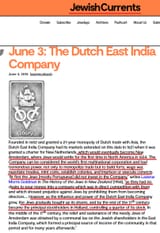Search Results
7/20/2025, 1:37:18 AM
>>510843294
Yeah, the (((dutch)))
The Dutch East India Company (VOC), established in 1602, was one of the most powerful and influential trading enterprises in history. Founded in the same year as the world’s first stock exchange in Amsterdam, the VOC held a monopoly on the spice trade between Western Europe and Asia, dominating global commerce during the 17th century.
In 1609, the VOC hired English sea captain and explorer Henry Hudson to find a Northeast Passage to Asia, a route that would allow ships to sail around Scandinavia and Russia. When Arctic ice blocked his path, Hudson abandoned the Northeast Passage and instead sailed westward in search of a Northwest Passage. During this voyage, he explored the northeastern coast of North America aboard the ship Halve Maen. His journey led to landfalls at Newfoundland and Cape Cod, marking some of the earliest European explorations of the region.
By 1621, Dutch settlers had established colonies in what would later become the states of New York, New Jersey, Delaware, and Connecticut, with smaller outposts in Pennsylvania and Rhode Island. This vast territory, known as New Netherland, was administered by the Dutch West India Company (WIC), founded in 1621. The WIC became the world’s first multinational corporation, backed by the financial infrastructure of a central bank and the Amsterdam stock exchange. It played a crucial role in managing Dutch colonial ventures in the Americas.
Yeah, the (((dutch)))
The Dutch East India Company (VOC), established in 1602, was one of the most powerful and influential trading enterprises in history. Founded in the same year as the world’s first stock exchange in Amsterdam, the VOC held a monopoly on the spice trade between Western Europe and Asia, dominating global commerce during the 17th century.
In 1609, the VOC hired English sea captain and explorer Henry Hudson to find a Northeast Passage to Asia, a route that would allow ships to sail around Scandinavia and Russia. When Arctic ice blocked his path, Hudson abandoned the Northeast Passage and instead sailed westward in search of a Northwest Passage. During this voyage, he explored the northeastern coast of North America aboard the ship Halve Maen. His journey led to landfalls at Newfoundland and Cape Cod, marking some of the earliest European explorations of the region.
By 1621, Dutch settlers had established colonies in what would later become the states of New York, New Jersey, Delaware, and Connecticut, with smaller outposts in Pennsylvania and Rhode Island. This vast territory, known as New Netherland, was administered by the Dutch West India Company (WIC), founded in 1621. The WIC became the world’s first multinational corporation, backed by the financial infrastructure of a central bank and the Amsterdam stock exchange. It played a crucial role in managing Dutch colonial ventures in the Americas.
7/12/2025, 12:37:47 AM
The Dutch East India Company (VOC), established in 1602, was one of the most powerful and influential trading enterprises in history. Founded in the same year as the world’s first stock exchange in Amsterdam, the VOC held a monopoly on the spice trade between Western Europe and Asia, dominating global commerce during the 17th century.
In 1609, the VOC hired English sea captain and explorer Henry Hudson to find a Northeast Passage to Asia, a route that would allow ships to sail around Scandinavia and Russia. When Arctic ice blocked his path, Hudson abandoned the Northeast Passage and instead sailed westward in search of a Northwest Passage. During this voyage, he explored the northeastern coast of North America aboard the ship Halve Maen. His journey led to landfalls at Newfoundland and Cape Cod, marking some of the earliest European explorations of the region.
By 1621, Dutch settlers had established colonies in what would later become the states of New York, New Jersey, Delaware, and Connecticut, with smaller outposts in Pennsylvania and Rhode Island. This vast territory, known as New Netherland, was administered by the Dutch West India Company (WIC), founded in 1621. The WIC became the world’s first multinational corporation, backed by the financial infrastructure of a central bank and the Amsterdam stock exchange. It played a crucial role in managing Dutch colonial ventures in the Americas.
In 1609, the VOC hired English sea captain and explorer Henry Hudson to find a Northeast Passage to Asia, a route that would allow ships to sail around Scandinavia and Russia. When Arctic ice blocked his path, Hudson abandoned the Northeast Passage and instead sailed westward in search of a Northwest Passage. During this voyage, he explored the northeastern coast of North America aboard the ship Halve Maen. His journey led to landfalls at Newfoundland and Cape Cod, marking some of the earliest European explorations of the region.
By 1621, Dutch settlers had established colonies in what would later become the states of New York, New Jersey, Delaware, and Connecticut, with smaller outposts in Pennsylvania and Rhode Island. This vast territory, known as New Netherland, was administered by the Dutch West India Company (WIC), founded in 1621. The WIC became the world’s first multinational corporation, backed by the financial infrastructure of a central bank and the Amsterdam stock exchange. It played a crucial role in managing Dutch colonial ventures in the Americas.
Page 1
